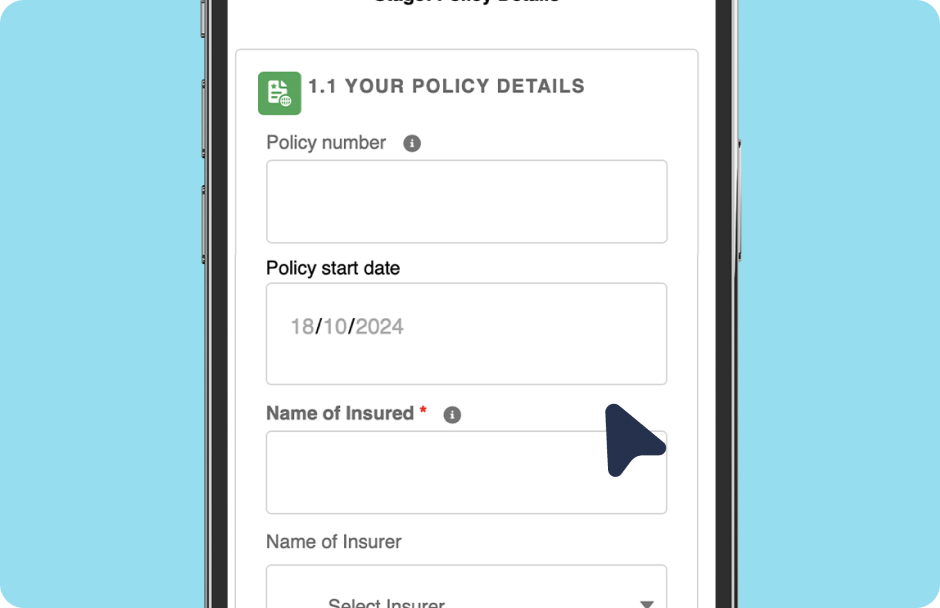Compare quotes from our trusted insurance partners:
On this page:
What is sole trader insurance?
Sole trader insurance is the different types of cover available to businesses owned and operated by one person. Business insurance for sole traders helps manage the cost of legal fees, compensation, and many other everyday business risks.
Australia is home to over 800,000 sole traders1. While they enjoy the freedom of being their own boss, sole traders are financially responsible for all business liabilities. Business insurance for sole traders can help protect your personal finance from work-related risks
BizCover offers customisable insurance options to fit the needs of a range of sole traders—from tradies and consultants to bookkeepers, beauticians, and more.
1 ABS statistics, 27 Aug 2024

Why do sole traders need insurance?
Sole traders may need insurance because they are personally and financially responsible for their business. Business insurance helps protect sole traders against the cost of lawsuits, accidents, property damage, and more.
Get a professional or trades license
Secure a business loan
Work as a contractor or sub-contractor
Pay legal costs if you face a liability claim
Which occupations may need sole trader insurance?
BizCover offers insurance options for a wide range of self-employed and sole trader business owners, including:
Do I need sole trader business insurance?
Maybe. Some types of insurance are legally required in Australia for certain sole traders, depending on your occupation or the industry you work in. For example, a sole trader may need Professional Indemnity or Public Liability receive a professional or trades license in some states and territories.
Workers’ compensation insurance is required for Australian businesses with employees, even if the business is registered as a sole trader. It provides financial support and medical benefits to employees who are injured on the job or suffer a work-related illness. However, sole traders themselves are not covered by workers’ compensation insurance and may decide to buy Personal Accident & Illness insurance to protect themselves on the job. (BizCover does not currently provide workers’ compensation insurance.)
Insurance may also be required by clients in their project contracts or by commercial property owners to lease business space.
Even if insurance is not mandatory for your business, you may still want to be covered. Legal fees, compensation payouts, repairs, and other unexpected bills could strain your finances and even put you out of business (in a worst-case scenario).
Types of sole trader insurance
Every business is unique, so we offer flexible insurance options for sole traders. Create an insurance package that fits your needs.
Common business insurance cover for sole traders:
Additional cover for sole traders:
Customised, on-the-go cover your small business
Start a quote to see how much you can save and buy online in minutes.
How much does sole trader business insurance cost?
Sole trader insurance costs can vary based on factors such as your business types and location. Compare multiple quotes from a great range of trusted leading insurers to find out how much you’ll pay.

Facts influencing cost
Risks of the industry
Cover level amount
Annual turnover
Number of employees
Claims history
Get cover that works with the risks of your business
Get flexible cover options to match your unique needs.
With BizCover, you can get Public Liability up to $20 million and Professional Indemnity up to $10 million.
Unsure how much to choose? Think about:
Underinsurance
We know it’s tempting to select a lower level of cover to reduce premiums, but this can leave businesses shocked and insufficiently covered when making a claim.
Ways underinsurance catches business owners out:
Inflation
With inflation, the cost of living and doing business increases. Remember to over yourself, your tools and assets for the rising costs of replacing or covering them, not what you paid for them – you may be surprised at the difference.
Not covering the full cost of your risks
If you select cover levels for less than the value you may be found liable – left out of pocket when it comes to claims time. It’s important to review your risks and determine how much you will need to cover any claim that may come your way.

Factors influencing cost
Risks of the industry
Cover level amount
Annual turnover
Number of employees
Claims history
Get cover that works with the risks of your business
Get flexible cover options to match your unique needs.
With BizCover, you can get Public Liability up to $20 million and Professional Indemnity up to $10 million.
Unsure how much to choose? Think about:
Statutory professional requirements
Cover required by contracts
Number of employees being covered
Your contract value
Worst case scenario claim size
Underinsurance
We know it’s tempting to select a lower level of cover to reduce premiums, but this can leave businesses shocked and insufficiently covered when making a claim.
Ways underinsurance catches business owners out:
Inflation
With inflation, the cost of living and doing business increases. Remember to over yourself, your tools and assets for the rising costs of replacing or covering them, not what you paid for them – you may be surprised at the difference.
Not covering the full cost of your risks
If you select cover levels for less than the value you may be found liable – left out of pocket when it comes to claims time. It’s important to review your risks and determine how much you will need to cover any claim that may come your way.
How It Works – Buying Online
5 easy steps to get instant cover online today

Select Profession
Pick Your Covers
Add Business Details
Compare Quotes
Get Covered Online
How To Make a Claim Online
We’ll assist you through the claims process & manage the claim directly with the insurer.

Let us know Fill out our
claims form and provide info
to support the claim
Receive extra support We
will assist you with your claim
Claim results We will notify
you of the claim outcome.



Award-Winning Tech & People
We’re not ones to blow our own trumpet, but we are pretty proud of our innovative insurance platform, outstanding team, and stellar workplace.
See How Much Others Have Saved By Purchasing a Policy Through BizCover
^ Savings made from January 2024 to April 2025. This information is provided as a guide only and may not reflect pricing for your particular business, as individual underwriting criteria will apply.
Frequently asked questions
There are many types of insurance that a sole trader may consider for their small business. Here are three popular options:
Public Liability is one of the most common types of cover for sole traders. It covers you if a third-party claims that your negligent business activities caused them injury or property damage. This includes defence costs cover.
Professional Indemnity is often required for sole traders to receive a professional license. It covers you for losses claimed by a third party and defence costs due to alleged or actual negligence in your professional services or advice.
Personal Accident & Illness insurance provides a weekly income benefit following an accidental injury or illness once signed off from work by a medical practitioner for a set amount of time. BizCover also has insurance options to help sole traders protect their business assets, manage cyberattacks, prepare for business interruptions, and more.
Insurance for sole traders can cover a wide range of incidents and risks, depending on the types of policies you choose. It can cover:
- Compensation claims – If your work activities cause injury or property damage to a third party.
- Legal expenses – If Including, court fees, defence costs, settlements and judgements.
- Tools and equipment – Repairing or replacing your essential business equipment, such as tools of trade, laptops, and other electronics.
- Cyberattacks – If your business is targeted by cybercrime or suffers a data breach.
- Injuries and illness – If you are injured or fall seriously ill and are unable to work.
Sole traders working from home may need some types of insurance. Some sole traders (such as accountants and real estate agents) are required to have insurance to maintain their professional license, even if they work from a home office or are self-employed. Clients may also require insurance as part of their contracts, regardless of where you do business.
Many sole traders working from home also choose business insurance to protect their business equipment, tools, records, and other business assets. Homeowners policies typically do not cover business activities. Business insurance can help protect you when working from a home office.
The main difference between Public Liability and Professional Indemnity insurance is the types of risks that each policy covers.
Public Liability insurance provides cover for legal fees and compensation costs if a customer, member of the public, or a supplier claims against you for injury or damage to their property as a result of your alleged negligent business activity (subject to the terms and conditions of your policy).
Professional Indemnity insurance covers losses claimed by a third party and defence costs due to alleged or actual negligence in professional services or advice (subject to the terms and conditions of your policy).
A Business Insurance Package is a customisable insurance bundle that can cover a variety of everyday business risks. Depending on the cover options you choose, you can protect your business contents, stock, tools, and commercial premises. Options are also available to cover business interruptions, tax audits, and more.
Most Australian businesses with employees must have workers’ compensation insurance. This applies to full-time and part-time staff, as well as casual workers.
Workers’ compensation insurance does not cover sole traders. This is why many sole traders choose Personal Accident & Illness insurance to provide a weekly income benefit following an accidental injury or illness once signed off from work by a medical practitioner for a set amount of time.
The terms “self-employed” and “sole trader” are both used to describe someone who works for themselves. Sole trader is a business structure that is commonly chosen by self-employed individuals, because it is simple and affordable to set up. However, self-employed individuals can register their business under a different business structure, such as a company.
Professionals, such as accountants and business attorneys, can help self-employed individuals decide which business structure best suits their needs.
It depends. Every small business is unique, each with their own risks and requirements. That’s why BizCover options flexible insurance options for sole traders. Pick and choose the cover options that fit your needs to build an insurance package that suits your business.
Some types of insurance for sole traders can help cover legal fees. Common options chosen by sole traders include Professional Indemnity insurance, Public Liability insurance, and Cyber Liability insurance. Your policy wordings will list what is and is not covered, including legal fees and court costs.
Sole traders can make a claim online through the BizCover website.
Business insurance checklist for sole traders
- List your potential risks and learn what types of insurance can help you manage them
- Review your insurance as your business grows and changes to ensure your cover still fits your needs
- Compare multiple quotes to find polices that fit your business needs and budget
- Carefully read your policy wordings to understand what you are (and aren’t) covered for
Hear from our customers
Looking for trusted small business insurance? This BizCover review shows how quick and easy it is to get covered online.
















Real-life customer reviews verified by Feefo